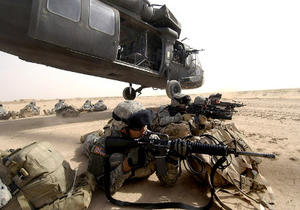U.S. stealthy war on terror expands, deepens; Special Operations forces take lead
The Obama administration has expanded and deepened the U.S. war on terror, and increase the role of Special Forces in that war; U.S. Special Forces are now deployed in 75 countries, compared with about 60 at the beginning of last year; plans exist for preemptive or retaliatory strikes in numerous places around the world, meant to be put into action when a plot has been identified, or after an attack linked to a specific group; the administration has also authorized the assassination of the radical Muslim cleric Anwar al-Awlaki, a rare — some say unprecedented — move against an American citizen

U.S. Special Operations forces during training // Source: wired.com
Theodore Roosevelt characterized the foreign policy of his administration (1901-9) as “Speak softly and carry a big stick.” A hundred years later, this very slogan may be aptly used to describe the national security policies of the Obama administration.
As the Washington Post’s Karen DeYoung and Greg Jaffe write, beneath its commitment to soft-spoken diplomacy and beyond the combat zones of Afghanistan and Iraq, the Obama administration has significantly expanded a largely secret U.S. war against al Qaeda and other radical groups.
Obama has also authorized the assassination of the radical Muslim cleric Anwar al-Awlaki, a rare — some say unprecedented — move against an American citizen (al-Awlaki was born in New Mexico and spent years as an imam in the United States before moving to the Yemen, where he remains in hiding).
In February, Dennis Blair, the then-director of U.S. national intelligence, confirmed that U.S. security agencies had the authority, having obtained specific permission, to kill American citizens if they posed a direct threat to the United States.
Special Operations forces have grown both in number and budget, and are deployed in 75 countries, compared with about 60 at the beginning of last year. In addition to units that have spent years in the Philippines and Colombia, teams are operating in Yemen and elsewhere in the Middle East, Africa, and Central Asia.
Commanders are developing plans for increasing the use of such forces in Somalia, where a Special Operations raid last year killed the alleged head of al Qaeda in East Africa. Plans exist for preemptive or retaliatory strikes in numerous places around the world, meant to be put into action when a plot has been identified, or after an attack linked to a specific group.
DeYoung and Jaffe write that the surge in Special Operations deployments, along with intensified CIA drone attacks in western Pakistan, is the other side of the national security doctrine of global engagement and domestic values President Obama released last week.
Obama, one senior military official told DeYoung and Jaffe, has allowed “things that the previous administration did not.”
Special Operations commanders have also become a far more regular presence at the White House than they were under George W. Bush’s administration, when most briefings on potential future operations were run through the Pentagon chain of command and were conducted by the defense secretary or the chairman of the Joint Chiefs of Staff.
